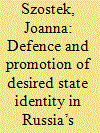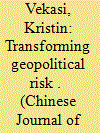| Srl | Item |
| 1 |
ID:
155456


|
|
|
|
|
| Summary/Abstract |
This article examines how the Russian state promotes and protects its preferred self-identity, using the conceptual framework of ‘strategic narrative’. Nation branding practices, including state-funded ‘mega-projects’ like the Sochi Olympics, have contributed to the narrative by characterising Russia as a welcoming, attractive destination. However, a more salient feature of Russia’s strategic narrative is intense ‘anti-Western’ and ‘anti-American’ political and media discourse, formulated to defend against rival, threatening narratives projected from other countries. Through analysis of official statements and state television content, this article demonstrates how determination to protect ‘great power’ and ‘European’ identities underlay Russia’s strategic narrative in 2014. It considers responses which the narrative has prompted, arguing that desired results in domestic reception have been achieved at the expense of unsatisfactory results internationally. Heavy-handed attacks on the identities of other states boost collective self-esteem among Russian citizens, but they fail to produce – and arguably obstruct – desired responses among foreign audiences.
|
|
|
|
|
|
|
|
|
|
|
|
|
|
|
|
| 2 |
ID:
152315


|
|
|
|
|
| Summary/Abstract |
This article addresses the strategies of multinational firms when faced with business risk arising from nationalist tensions and interstate conflict, focusing on the use of social engagement activities under the rubric of corporate social responsibility (CSR) that are targeted at the host country’s society at large. The adoption of this strategy is contingent on firms’ risk perception: firms with higher degrees of risk perception invest more resources in social strategies. Moreover, as firms are more exposed to risk over time, they shift their risk management strategies to ones that try to transform the nature of risk through private sector activities that resemble public diplomacy. The argument is tested quantitatively using unique data on the contributions of Japanese firms to social engagement activities in China, and qualitatively with descriptive statistics from surveys of CSR activities and elite interviews with state and business actors in China and Japan. The findings highlight new sociopolitical roles for multinational firms in international politics.
|
|
|
|
|
|
|
|
|
|
|
|
|
|
|
|